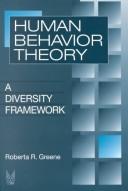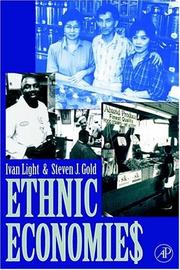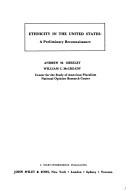| Listing 1 - 10 of 51 | << page >> |
Sort by
|

ISBN: 020236089X Year: 1994 Publisher: New York Aldine de Gruyter
Abstract | Keywords | Export | Availability | Bookmark
 Loading...
Loading...Choose an application
- Reference Manager
- EndNote
- RefWorks (Direct export to RefWorks)

ISBN: 0122871553 Year: 2000 Publisher: San Diego London Tokyo Academic Press
Abstract | Keywords | Export | Availability | Bookmark
 Loading...
Loading...Choose an application
- Reference Manager
- EndNote
- RefWorks (Direct export to RefWorks)
Book
ISBN: 0824074165 Year: 1991 Publisher: New York London Garland
Abstract | Keywords | Export | Availability | Bookmark
 Loading...
Loading...Choose an application
- Reference Manager
- EndNote
- RefWorks (Direct export to RefWorks)

ISBN: 0471324655 9780471324652 Year: 1974 Publisher: New York
Abstract | Keywords | Export | Availability | Bookmark
 Loading...
Loading...Choose an application
- Reference Manager
- EndNote
- RefWorks (Direct export to RefWorks)
Sociology of minorities --- United States --- Minorities --- Minorities - United States --- United States of America
Book
ISBN: 9780745656083 9780745656076 0745656072 0745656080 1509527400 Year: 2017 Publisher: Malden, MA : Polity Press,
Abstract | Keywords | Export | Availability | Bookmark
 Loading...
Loading...Choose an application
- Reference Manager
- EndNote
- RefWorks (Direct export to RefWorks)
George W. Bush was president when I started teaching New York University undergraduates about lesbian, gay, bisexual, transgender, and queer (LGBTQ) social movements. Gay-straight alliances were much tougher to find for young people who sought out institutional supports in their schools. Some same-sex sexual activity was still criminalized in more than a dozen states in the United States. Positive representation of LGBTQ people in mainstream popular culture was sparse. Same-sex marriage was not legal anywhere in the U.S. I found then – as now – that my students had encountered very little about LGBTQ politics in high school or college, yet they were eager to learn about and learn from LGBTQ activists and movements. Through the years, as LGBTQ social change has become central to American politics and culture, my students’ interest has only grown.There are many wonderful resources to help students like mine. But, in my teaching experience, I had not yet found a broad yet short, accessible, thematic book on LGBTQ social change that could be adopted in a course like the one I teach. LGBTQ Social Movements is a book that I hope will engage students on the issues and themes that matter to and resonate with them. It is also a book for anyone who wants to understand a bit about LGBTQ history and politics in the U.S. With Donald Trump’s election, even the hard-won and most basic civil rights gains for LGBTQ people are in peril and are quite precarious. Many people are asking now how we move this country forward. I think we can learn a lot from these movements for sexual and gender justice.One lesson from the LGBTQ social movements in the U.S. is that we need to think about social movements in broad ways. When I started teaching in the early 2000s, there was not much of a mass movement for social justice in the U.S. This has changed in recent years, especially with the Black Lives Matter movement and with activists’ collective responses to the Trump presidency. But, in these years when there was not much mass mobilization, young people often talked in class about what they could do, in the absence of a broad movement. I remember – as a child of the 1980s – feeling the same way: looking admiringly back at the movements of the ‘60s and ‘70s and feeling that they had passed me by. But we see, in LGBTQ movements over time, that activism works on many fronts. In uncertain times, we can remember that activists always had a lot of tools in their kit: from – as we can see in the history of LGBTQ social change – collectively hurling doughnuts at police officers in an effort to resist arrest, to publishing underground magazines, to unrolling a giant condom over an anti-gay senator’s house to draw attention to his bigotry and to the fight against AIDS, to marching en masse in the street for pride and visibility rather than shame and closets. Social movements take many forms and have never only been about large groups of people demonstrating with signs and bullhorns. Social action can be artistic. It can be cultural. It can be collective, but where the community exists online rather than in person. It can be about changing law and policy. It can also be about changing hearts and minds.Another lesson that LGBTQ social movements teach us is that diversity and difference within a movement can be challenging but also critical to face and embrace. We have seen that differences in identity and power create divisions and inequalities within the broad movement – for example, in the homophobia and transphobia of some feminists in the 1960s and ‘70s and in the lack of adequate examination of race and class privilege by many white, gay, well-off, cisgender men in the gay rights movement. We also see, though, that diversity can be mobilized in really important ways – through mass mobilizations that embrace and celebrate difference, through work that draws on intersectional identities, and through coalitional activism. History teaches us that we cannot fully understand and achieve LGBTQ equality if we do not also embrace equality and justice for LGBTQ people of color, immigrants, and religious minorities, for example.LGBTQ social movements also teach us that most social justice fights in the U.S. have to do, ultimately, with struggles over who gets to be an American, who gets to call the country home and feel entitled to the rights, laws, and protections it provides. We see this in so many ways in the LGBTQ social movements since World War II – from the post-war, McCarthy-era directive to expel any “sexual pervert” from federal jobs while depicting gay Americans as dangerous to the state and its citizens, to President Ronald Reagan’s refusal to put the resources of the federal government behind fighting the AIDS epidemic, to the present time when President Trump has attempted (and failed) to ban transgender service members from the military. While LGBTQ movements may be by and on behalf of a relatively small group of people, they are fighting for American belonging. And this fight over whom the country ultimately serves and protects should concern all Americans.There are many more lessons from these generations of LGBTQ activists. A focus on LGBTQ social movements both allows us to celebrate past victories and offers some guidance for how to move into the future during these challenging political and cultural times. I hope that LGBTQ Social Movements provides a beginning look and a starting point for anyone who might like to learn more
Book
ISBN: 0674332385 Year: 2014 Publisher: Cambridge, MA : Harvard University Press,
Abstract | Keywords | Export | Availability | Bookmark
 Loading...
Loading...Choose an application
- Reference Manager
- EndNote
- RefWorks (Direct export to RefWorks)
Civilization. --- Geografie, Reisen. --- Minorities. --- Minorities -- United States. --- United States -- Civilization -- 20th century.
Book
ISBN: 0824074017 Year: 1990 Publisher: New York Garland Pub.
Abstract | Keywords | Export | Availability | Bookmark
 Loading...
Loading...Choose an application
- Reference Manager
- EndNote
- RefWorks (Direct export to RefWorks)
Book
ISBN: 0824074084 Year: 1991 Publisher: New York Garland Pub.
Abstract | Keywords | Export | Availability | Bookmark
 Loading...
Loading...Choose an application
- Reference Manager
- EndNote
- RefWorks (Direct export to RefWorks)

ISBN: 082407405X Year: 1991 Publisher: New York London Garland Pub.
Abstract | Keywords | Export | Availability | Bookmark
 Loading...
Loading...Choose an application
- Reference Manager
- EndNote
- RefWorks (Direct export to RefWorks)

ISBN: 0810828243 Year: 1994 Publisher: Metuchen Scarecrow Press
Abstract | Keywords | Export | Availability | Bookmark
 Loading...
Loading...Choose an application
- Reference Manager
- EndNote
- RefWorks (Direct export to RefWorks)
| Listing 1 - 10 of 51 | << page >> |
Sort by
|

 Search
Search Feedback
Feedback About
About Help
Help News
News